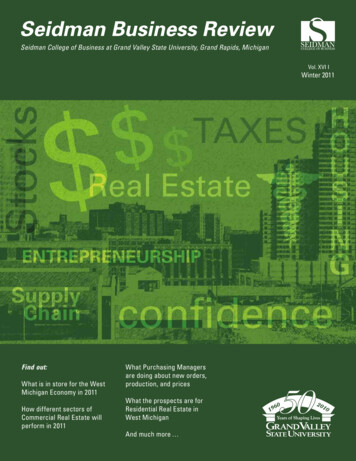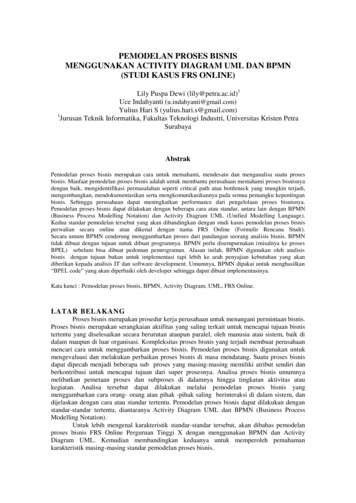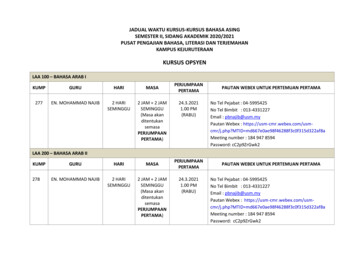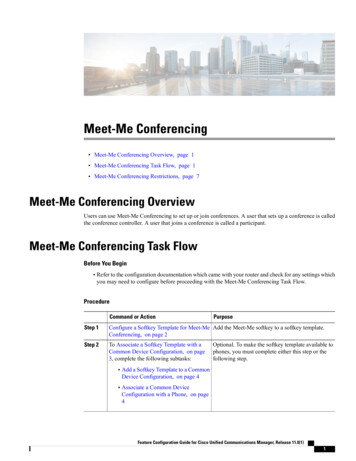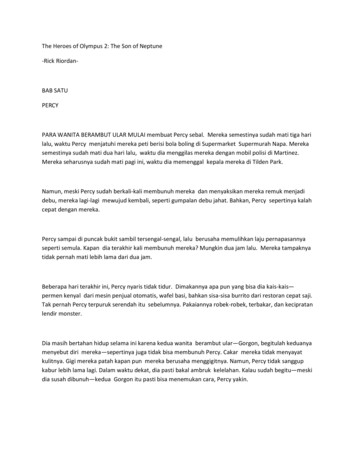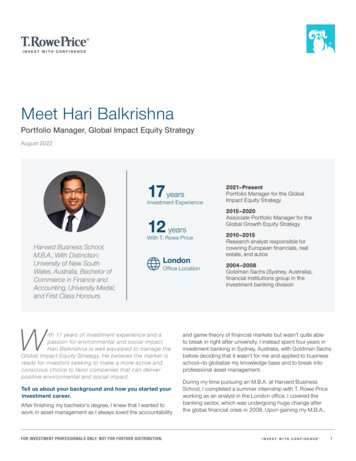
Transcription
Meet Hari BalkrishnaPortfolio Manager, Global Impact Equity StrategyAugust 202217 yearsInvestment Experience12 yearsWith T. Rowe PriceHarvard Business School,M.B.A., With Distinction;University of New SouthWales, Australia, Bachelor ofCommerce in Finance andAccounting, University Medal,and First Class Honours.LondonOffice LocationWith 17 years of investment experience and apassion for environmental and social impact,Hari Balkrishna is well equipped to manage theGlobal Impact Equity Strategy. He believes the market isready for investors seeking to make a more active andconscious choice to favor companies that can deliverpositive environmental and social impact.Tell us about your background and how you started yourinvestment career.After finishing my bachelor’s degree, I knew that I wanted towork in asset management as I always loved the accountabilityFOR INVESTMENT PROFESSIONALS ONLY. NOT FOR FURTHER DISTRIBUTION.2021–PresentPortfolio Manager for the GlobalImpact Equity Strategy2015–2020Associate Portfolio Manager for theGlobal Growth Equity Strategy2010–2015Research analyst responsible forcovering European financials, realestate, and autos2004–2008Goldman Sachs (Sydney, Australia),financial institutions group in theinvestment banking divisionand game theory of financial markets but wasn’t quite ableto break in right after university. I instead spent four years ininvestment banking in Sydney, Australia, with Goldman Sachsbefore deciding that it wasn’t for me and applied to businessschool—to globalize my knowledge base and to break intoprofessional asset management.During my time pursuing an M.B.A. at Harvard BusinessSchool, I completed a summer internship with T. Rowe Priceworking as an analyst in the London office. I covered thebanking sector, which was undergoing huge change afterthe global financial crisis in 2008. Upon gaining my M.B.A.,1
I accepted a role as an investment analyst at T. Rowe Pricecovering European and Canadian banks, autos, and real estate.Prior to my role as portfolio manager for the Global ImpactEquity Strategy, I was an associate portfolio manager for theGlobal Growth Equity Strategy for six years, working withScott Berg. This was a fantastic grounding in globalizing one’sinvestment knowledge across sectors, but more importantlyin building and deepening working relationships with all ouranalysts, sector portfolio managers, and diversified portfoliomanagers around the world.having lived and worked in fivedifferent continents, I have builtan appreciation for different socialconstructs and have always beena passionate believer in solving forclimate change.Can public equity investing really make an impact on keyenvironmental and social concerns, especially comparedwith private investing?While impact investing was originally the domain of privateinvestors, we believe the potential to capture and createimpact in public equity markets has broadened tremendouslyover the past decade. Ambitious international and localgoals are being set on environmental and social initiativesto directly address risks and promote change. Among themare the UN Sustainable Development Goals (SDG), a globallyrecognized framework that aims to end poverty, protect theplanet, and ensure prosperity. On its own, it is estimatedthat approximately USD 2.5 trillion of capital will be neededannually until 2030 to achieve the UN SDG objectives.1If we aspire to accelerate these and other initiatives that targetsocial and environmental transitions, it is essential to fundthem at scale and in a liquid manner—so public equity marketswill be critical to that effort. The enormity of issues like cleanenergy transition will not be possible without the backing oflarge and well‑funded publicly listed firms.Excitingly, the opportunity to own businesses that createa positive environmental or social impact is greater thanever before in public equity markets, as companies shouldshift investment to address environmental and societalpressure points.What attracted you to impact investing?At a personal level, having lived and worked in five differentcontinents, I have built an appreciation for different socialconstructs and have always been a passionate believer insolving for climate change. The strategy was born throughour desire to contribute in a positive way to the challenges ourplanet and society face today. We believe impact investingis the most direct way we can influence and address thesechallenges—via conscious action, engagement, and skilledexecution. It goes beyond simply owning and capturing theeconomics and activities of certain types of companies. Capitalmust also be directed toward desired impact outcomes,alongside engaging with company management and activeproxy voting to help achieve the best results.Impact investing also brings a nonfinancial dimension to theinvestment process—a values‑based approach that seekspositive environmental and/or social impact as part of distinctperformance targets and is material, measurable, and additional.We believe that impact investing is key to putting investors onthe right side of societal and environmental change. Capital canbe directly deployed into companies that seek positive impactand are change‑enabling. But this has to be combined withfundamental analysis, deep research, and valuation discipline.1Impact investing has growntremendously in recent years, in partbecause investors are not being askedto accept a sacrifice of returns in orderto implement a values‑based approach.How do you make a difference for clients as an impactinvestment manager?We aspire to be a partner to our clients, using our full breadthof ideas in seeking to harvest both impact and potential alphaover the long term. Impact investing has grown tremendouslyin recent years, in part because investors are not beingasked to accept a sacrifice of returns in order to implement avalues‑based approach.Source: World Investment Report, United Nations Conference on Trade and Development (UNCTAD).2
Part of my role as an impact portfolio manager is to helpindividuals and institutions make sense of what’s happeningin the world around us and how that could manifest into risksand opportunities within an investment portfolio. For example,as the environmental costs of climate change accelerate,planning for the future and thinking about climate mitigationcan genuinely help a company’s bottom line.As businesses become more conscious and active in aligningcapital with the economic returns that can legitimately flowfrom addressing environmental or social tensions, I expectopportunities to grow. That is important because breadth is akey foundation of consistency and meeting the return objectivesof impact investing. In short, we are in an era of growth withrespect to the opportunity set of impact stocks, and it is aprivilege to help our clients access these opportunities.From an alpha perspective, we also believe impact‑orientedcompanies can offer better topline and bottom‑line growthopportunities than the index. Often these companies haveproducts that are in high demand from consumers, but alsohave business models that regulators wish to incentivize as wetry to achieve net zero targets.future operations and the alignment of earnings or revenueswith our impact pillars and the UN SDGs. We use the word“future” very deliberately, given the rapid evolution of manybusinesses and the need to look forward.Importantly, as a truly global asset manager, we are readyto supply new capital to areas of target impact. We use ourposition of ownership to enter into dialogues with companieswhere we can see the potential to accelerate the good aspectsof their operations, while helping to mitigate the negative partsthat naturally exist even in the purest of business operations.Change takes time and requires resilience, but this isconsistent with many aspects of successful long‑term investing.How does your portfolio differ from the theme/factorof ESG, sustainability, or even impact?It is important to distinguish that impact investing is notenvironmental, social, or governance (ESG) integration, andit is also a different discipline from sustainable investing. Itincorporates both, but takes it a step further. Impact investingin public equity markets lives in the same domain as otherstyles of investing. We do not believe there needs to be asacrifice of return potential, and we believe the opportunityset is unrecognizable from a decade ago. Impact investing isalso outward‑looking (planet and society) and forward‑lookingcompared with ESG integration and sustainability, which tendto look at a company’s own operations much more.It involves directing fresh capital towarddesired impact outcomes, alongsideimpact‑oriented company engagement,proxy voting, and the associatedinfluence feedback loop.But impact investing backed by stock picking outcomesrequires equal, if not greater, levels of due diligence to avoidexcessive concentration, crowding, and disappointment.A forward‑looking perspective, a stable and expert researchfoundation, and a good level of imagination are key featuresof successful investment processes.Can an investment manager contribute topositive impact?Change is often born of extremes—and we are living in a periodof extremes in many respects. The challenges of our era havecreated open and broad debate about the rights and freedomsof humankind, the growth in inequality, and the clear andobvious pressures on our environment. To this point, rarelyhave society and investors mobilized in the way we have seenin the past two years, with clear and raised expectations as tohow businesses should conduct themselves in the context ofthe societies and the environments in which they operate.Impact is achieved within an investment portfolio in more waysthan simply owning and capturing the economics and activitiesof certain types of companies. It involves directing fresh capitaltoward desired impact outcomes, alongside impact‑orientedcompany engagement, proxy voting, and the associatedinfluence feedback loop.As a starting point, we screen companies through an impactlens for both materiality and measurability of the desiredoutcome. This requires an understanding of a business in thecontext of a defined impact framework. For us, this is drivenby a combination of evaluating a company’s current andWhat does the future look like for impact investing?We are encouraged by the significance and action businessesare applying to demands for new and improved principles.Companies are innovating in response to society’s demandsfor solutions to pressing issues, and industry leaders areadapting in recognition of their responsibilities. This hascreated an increasing number of opportunities to accesspositive impact within public equity markets.3
Share with us your personal interests and how they might(or might not) intersect with your professional work.I strongly believe in the importance of work‑life balance.I have two children with a range of interests, and I enjoyspending as much time with them as possible, especiallyplaying cricket and squash with them. I also love cycling,playing squash, and badminton.I cochair the London Corporate Responsibility Committee,which is an opportunity to allow T. Rowe Price associatesto have an impact on our local communities. It is extremelyrewarding work where we can make a real difference to thecommunities around us. Volunteering and charity work is alsoa daily reminder of the purpose of impact investing—trying tochannel capital toward making a difference and making theworld a better place.Risks—the following risks are materially relevant to the portfolio:Capital risk—The value of your investment will vary and is not guaranteed. It will be affected by changes in the exchange ratebetween the base currency of the portfolio and the currency in which you subscribed, if different.Environment, social and governance and sustainability risk—Due to environmental changes, shifting societal views, and anevolving regulatory landscape related to sustainability issues, the earnings and/or profitability of companies that a portfolio investsin may be impacted.Equity risk—In general, equities involve higher risks than bonds or money market instruments.Geographic concentration risk—To the extent that a portfolio invests a large portion of its assets in a particular geographic area,its performance will be more strongly affected by events within that area.Hedging risk—A portfolio’s attempts to reduce or eliminate certain risks through hedging may not work as intended.Investment portfolio risk—Investing in portfolios involves certain risks an investor would not face if investing in markets directly.Management risk—The investment manager or its designees may at times find their obligations to a portfolio to be in conflict withtheir obligations to other investment portfolios they manage (although in such cases, all portfolios will be dealt with equitably).Operational risk—Operational failures could lead to disruptions of portfolio operations or financial losses.4
T. Rowe Price focuses on delivering investment managementexcellence that investors can rely on—now and over the long term.Important InformationThis material is being furnished for general informational and/or marketing purposes only. The material does not constitute or undertake to give advice of any nature,including fiduciary investment advice, nor is it intended to serve as the primary basis for an investment decision. Prospective investors are recommended to seek independentlegal, financial and tax advice before making any investment decision. T. Rowe Price group of companies including T. Rowe Price Associates, Inc. and/or its affiliates receiverevenue from T. Rowe Price investment products and services. Past performance is not a reliable indicator of future performance. The value of an investment and any incomefrom it can go down as well as up. Investors may get back less than the amount invested.The material does not constitute a distribution, an offer, an invitation, a personal or general recommendation or solicitation to sell or buy any securities in any jurisdiction or toconduct any particular investment activity. The material has not been reviewed by any regulatory authority in any jurisdiction.Information and opinions presented have been obtained or derived from sources believed to be reliable and current; however, we cannot guarantee the sources’ accuracyor completeness. There is no guarantee that any forecasts made will come to pass. The views contained herein are as of the date written and are subject to change withoutnotice; these views may differ from those of other T. Rowe Price group companies and/or associates. Under no circumstances should the material, in whole or in part, becopied or redistributed without consent from T. Rowe Price.The material is not intended for use by persons in jurisdictions which prohibit or restrict the distribution of the material and in certain countries the material is provided uponspecific request. It is not intended for distribution to retail investors in any jurisdiction.Australia—Issued in Australia by T. Rowe Price Australia Limited (ABN: 13 620 668 895 and AFSL: 503741), Level 50, Governor Phillip Tower, 1 Farrer Place, Suite 50B,Sydney, NSW 2000, Australia. For Wholesale Clients only.Brunei—This material can only be delivered to certain specific institutional investors for informational purpose upon request only. The strategy and/or any products associatedwith the strategy has not been authorised for distribution in Brunei. No distribution of this material to any member of the public in Brunei is permitted.Canada—Issued in Canada by T. Rowe Price (Canada), Inc. T. Rowe Price (Canada), Inc.’s investment management services are only available to Accredited Investors asdefined under National Instrument 45-106. T. Rowe Price (Canada), Inc. enters into written delegation agreements with affiliates to provide investment management services.DIFC—Issued in the Dubai International Financial Centre by T. Rowe Price International Ltd. This material is communicated on behalf of T. Rowe Price International Ltd. by itsrepresentative office which is regulated by the Dubai Financial Services Authority. For Professional Clients only.EEA—Unless indicated otherwise this material is issued and approved by T. Rowe Price (Luxembourg) Management S.à r.l. 35 Boulevard du Prince Henri L-1724 Luxembourgwhich is authorised and regulated by the Luxembourg Commission de Surveillance du Secteur Financier. For Professional Clients only.Hong Kong—Issued in Hong Kong by T. Rowe Price Hong Kong Limited, 6/F, Chater House, 8 Connaught Road Central, Hong Kong. T. Rowe Price Hong Kong Limited islicensed and regulated by the Securities & Futures Commission. For Professional Investors only.Indonesia—This material is intended to be used only by the designated recipient to whom T. Rowe Price delivered; it is for institutional use only. Under no circumstancesshould the material, in whole or in part, be copied, redistributed or shared, in any medium, without prior written consent from T. Rowe Price. No distribution of this material tomembers of the public in any jurisdiction is permitted.Korea—This material is intended only to Qualified Professional Investors upon specific and unsolicited request and may not be reproduced in whole or in part nor can they betransmitted to any other person in the Republic of Korea.Mainland China—This material is provided to specific qualified domestic institutional investor or sovereign wealth fund on a one-on-one basis. No invitation to offer, or offer for,or sale of, the shares will be made in the mainland of the People’s Republic of China (“Mainland China”, not including the Hong Kong or Macau Special Administrative Regionsor Taiwan) or by any means that would be deemed public under the laws of the Mainland China. The information relating to the strategy contained in this material has not beensubmitted to or approved by the China Securities Regulatory Commission or any other relevant governmental authority in the Mainland China. The strategy and/or any productassociated with the strategy may only be offered or sold to investors in the Mainland China that are expressly authorized under the laws and regulations of the Mainland Chinato buy and sell securities denominated in a currency other than the Renminbi (or RMB), which is the official currency of the Mainland China. Potential investors who are residentin the Mainland China are responsible for obtaining the required approvals from all relevant government authorities in the Mainland China, including, but not limited to, the StateAdministration of Foreign Exchange, before purchasing the shares. This document further does not constitute any securities or investment advice to citizens of the MainlandChina, or nationals with permanent residence in the Mainland China, or to any corporation, partnership, or other entity incorporated or established in the Mainland China.Malaysia—This material can only be delivered to specific institutional investor upon specific and unsolicited request. The strategy and/or any products associated with thestrategy has not been authorised for distribution in Malaysia. This material is solely for institutional use and for informational purposes only. This material does not provideinvestment advice or an offering to make, or an inducement or attempted inducement of any person to enter into or to offer to enter into, an agreement for or with a viewto acquiring, disposing of, subscribing for or underwriting securities. Nothing in this material shall be considered a making available of, solicitation to buy, an offering forsubscription or purchase or an invitation to subscribe for or purchase any securities, or any other product or service, to any person in any jurisdiction where such offer,solicitation, purchase or sale would be unlawful under the laws of Malaysia.New Zealand—Issued in New Zealand by T. Rowe Price Australia Limited (ABN: 13 620 668 895 and AFSL: 503741), Level 50, Governor Phillip Tower, 1 Farrer Place,Suite 50B, Sydney, NSW 2000, Australia. No Interests are offered to the public. Accordingly, the Interests may not, directly or indirectly, be offered, sold or delivered in NewZealand, nor may any offering document or advertisement in relation to any offer of the Interests be distributed in New Zealand, other than in circumstances where there is nocontravention of the Financial Markets Conduct Act 2013.Philippines—THE STRATEGY AND/ OR ANY SECURITIES ASSOCIATED WITH THE STRATEGY BEING OFFERED OR SOLD HEREIN HAVE NOT BEEN REGISTEREDWITH THE SECURITIES AND EXCHANGE COMMISSION UNDER THE SECURITIES REGULATION CODE. ANY FUTURE OFFER OR SALE OF THE STRATEGY AND/ ORANY SECURITIES IS SUBJECT TO REGISTRATION REQUIREMENTS UNDER THE CODE, UNLESS SUCH OFFER OR SALE QUALIFIES AS AN EXEMPT TRANSACTION.Singapore—Issued in Singapore by T. Rowe Price Singapore Private Ltd. (UEN: 201021137E), No. 501 Orchard Rd, #10-02 Wheelock Place, Singapore 238880.T. Rowe Price Singapore Private Ltd. is licensed and regulated by the Monetary Authority of Singapore. For Institutional and Accredited Investors only.South Africa—T. Rowe Price International Ltd (TRPIL), 60 Queen Victoria Street, London, EC4N 4TZ, is an authorised financial services provider under the Financial Advisory andIntermediary Services Act, 2002 (Financial Services Provider (FSP) Licence Number 31935), authorised to provide “intermediary services” to South African Investors. TRPIL sComplaint Handling Procedures are available to clients upon request. The Financial Advisory and Intermediary Services Act Ombud in South Africa deals with complaints fromclients against FSPs in relation to the specific services rendered by FSPs. The contact details are noted below: Telephone: 27 12 762 5000, Web: www.faisombud.co.za,Email: info@faisombud.co.zaSwitzerland—Issued in Switzerland by T. Rowe Price (Switzerland) GmbH, Talstrasse 65, 6th Floor, 8001 Zurich, Switzerland. For Qualified Investors only.Taiwan—This does not provide investment advice or recommendations. Nothing in this material shall be considered a solicitation to buy, or an offer to sell, a security, or anyother product or service, to any person in the Republic of China.Thailand—This material has not been and will not be filed with or approved by the Securities Exchange Commission of Thailand or any other regulatory authority in Thailand.The material is provided solely to “institutional investors” as defined under relevant Thai laws and regulations. No distribution of this material to any member of the public inThailand is permitted. Nothing in this material shall be considered a provision of service, or a solicitation to buy, or an offer to sell, a security, or any other product or service, toany person where such provision, offer, solicitation, purchase or sale would be unlawful under relevant Thai laws and regulations.UK—This material is issued and approved by T. Rowe Price International Ltd, 60 Queen Victoria Street, London, EC4N 4TZ which is authorised and regulated by the UKFinancial Conduct Authority. For Professional Clients only.USA—Issued in the USA by T. Rowe Price Associates, Inc., 100 East Pratt Street, Baltimore, MD, 21202, which is regulated by the U.S. Securities and Exchange Commission.For Institutional Investors only. 2022 T. Rowe Price. All Rights Reserved. T. ROWE PRICE, INVEST WITH CONFIDENCE, and the Bighorn Sheep design are, collectively and/or apart, trademarks ofT. Rowe Price Group, Inc.ID0005299 (08/2022)202208‑23372385
It is important to distinguish that impact investing is not environmental, social, or governance (ESG) integration, and it is also a different discipline from sustainable investing. It incorporates both, but takes it a step further. Impact investing in public equity markets lives in the same domain as other styles of investing.

